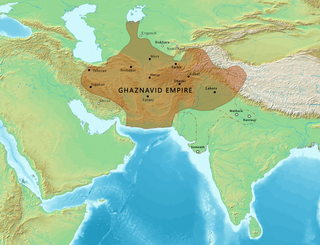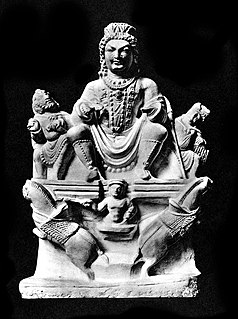
Ghazni, historically known as Ghaznin (غزنين) or Ghazna (غزنه), also transliterated as Ghuznee, and anciently known as Alexandria in Opiana, is a city in southeastern Afghanistan with a population of around 190,000 people. The city is strategically located along Highway 1, which has served as the main road between Kabul and Kandahar for thousands of years. Situated on a plateau at 2,219 metres (7,280 ft) above sea level, the city is 150 kilometres (93 mi) south of Kabul and is the capital of Ghazni Province.

The Ghaznavid dynasty was a Persianate Sunni Muslim dynasty of Turkic mamluk origin, ruling, at its greatest extent, large parts of Persia, Khorasan, much of Transoxiana and the northwest Indian subcontinent from 977 to 1186. The dynasty was founded by Sabuktigin upon his succession to the rule of Ghazna after the death of his father-in-law, Alp Tigin, who was an ex-general of the Samanid Empire from Balkh, north of the Hindu Kush in Greater Khorasan.

Abu Mansur Nasir al-Din Sabuktigin, also spelled as Sabuktagin, Sabuktakin, Sebüktegin and Sebük Tigin, was the founder of the Ghaznavid dynasty, ruling from 367 A.H/977 A.D to 387 A.H/997 A.D. In Turkic the name means beloved prince.

Yamīn-ud-Dawla Abul-Qāṣim Maḥmūd ibn Sebüktegīn, usually known as Mahmud of Ghazni or Mahmud Ghaznavi, was the founder of the Turkic Ghaznavid dynasty, ruling from 998 to 1030. At the time of his death, his kingdom had been transformed into an extensive military empire, which extended from northwestern Iran proper to the Punjab in the Indian subcontinent, Khwarazm in Transoxiana, and Makran.

Mu'izz ad-Din Muhammad ibn Sam, born Shihab ad-Din, also known as Muhammad of Ghor, was the Sultan of the Ghurid Empire from 1173 to 1206. He is credited with laying the foundation of Muslim rule in the Indian subcontinent, which lasted for several centuries. He reigned over a territory spanning over parts of modern-day Afghanistan, Bangladesh, Iran, Northern India, Pakistan, Tajikistan and Turkmenistan.
Nasir al-Din, was originally a honorific title and is an Arabic masculine given name. There are many variant spellings in English.
Mahmud is a transliteration of the male Arabic given name محمود, common in most parts of the Islamic world. It comes from the Arabic triconsonantal root Ḥ-M-D, meaning praise, along with Muhammad.

The Ghiljī also spelled Khilji, Khalji, or Ghilzai or Ghilzay (غلزی), are one of the largest Pashtun tribes. Their traditional homeland is Ghazni and Qalati Ghilji in Afghanistan but they have also settled in other regions throughout the Afghanistan-Pakistan Pashtun belt. The Khilji dynasty was a dynasty in Delhi Sultanate founded by Jalaluddin Khalji and expanded by Alauddin Khalji who were from Ghilji tribe. The modern nomadic Kochi people are predominantly made up of Ghilji tribes. The Ghilji make up around 20-25% of Afghanistan's total population.

The Ghurid dynasty was a Persianate dynasty and a clan of presumably eastern Iranian Tajik origin, which ruled from the 10th-century to 1215. The Ghurids were centered in the Ghor of present-day central Afghanistan, where they initially started out as local chiefs. They gradually converted to Sunni Islam from Buddhism after the conquest of Ghor by the Ghaznavid Sultan Mahmud of Ghazni in 1011. The dynasty ultimately overthrew the Ghaznavid Empire when Muhammad of Ghor conquered the last Ghaznavid principality of Lahore in 1186 from Khusrau Malik.

Khan is a surname commonly found in parts of South Asia and Iran. It is derived from the historic title khan, referring to a military chief or ruler; it originated as a hereditary title among nomadic tribes in the Central and Eastern Eurasian Steppe during antiquity and was popularized by Turkic dynasties in the rest of Asia as well as in Eastern Europe during the medieval period. The name's earliest discovered usage as a title for chiefs and for monarchs dates back respectively to the Xianbei and the Rourans, two proto-Mongolic societies in Inner Asia during antiquity; in the Pannonian Basin and Carpathian Mountains and their surrounding regions of Central and Southeast Europe, the title was used by the Pannonian Avars and the early Bulgars during the early medieval period before being more widely spread by various Muslim chieftains in a region spanning the empires centred in modern-day Turkey and Crimea to those in the Indian subcontinent.
Masoud (also spelled Massoud, Massoude, Massudeh, Masood, Masʽud, Masud, Mashud, Messaoud, Mesut, Mesud or Mosād, in Arabic: مسعود اِقرا:مَس عَود, in Persian: مسعود خوانده شود:مسود, is a given name meaning "fortunate", "prosperous", or "lucky and happy". The origin of this name is Arabic. It is a quite popular male given name and also a common surname in the Arab world, Iran, Turkey, Tajikistan, Afghanistan, Uzbekistan, Pakistan and also found to be used in Palestine, Russia, India, Bangladesh, Malaysia and China.

Communities of various religious and ethnic background have lived in the land of what is now Afghanistan. Before the Islamic conquest, south of the Hindu Kush was ruled by the Zunbil and Kabul Shahi rulers. When the Chinese travellers visited Afghanistan between 399 and 751 AD, they mentioned that Buddhism was practiced in different areas between the Amu Darya in the north and the Indus River in the south. The land was ruled by the Kushans followed by the Hephthalites during these visits. It is reported that the Hephthalites were fervent followers of the god Surya.
Gilani or Gillani is a toponymic surname (nisba) linked to the Gilan Province in Iran. It is also used by people indicating association with the founder of the Qadiriyya Sufi order Abdul Qadir Gilani. Notable people with the surname include:
Ghazni is a city in central Afghanistan. It may also refer to:

Rafiq Ghaznavi was a British Indian musician and actor, known for his contributions in Abdul Rashid Kardar's Heer Ranjha (1932) film, Mehboob Khan's Taqdeer (1943), film Ek Din Ka Sultan (1945) among others. He was educated at Islamia College, Lahore.
Khusrau Shah was the penultimate sultan of the Ghaznavid Dynasty from 1157 to 1160., and the eldest son of Bahram-Shah. During his short reign, he lost southeastern Afghanistan to Ala al-Din Husayn, Malik of Ghurid empire. He was succeeded by his son, Khusrau Malik.
Al-Hashimi, also transliterated Al-Hashemi, Hashemi, Hashimi or Hashmi is an Arabic, Arabian, and Persian surname. The definite article Al- usually distinguishes the Arabic from the more numerous form.
Ansari or Al Ansari is a typically Muslim surname mainly found in the Middle East and South Asia. People with the surname Al-Ansari or Ansari are said to be the descendants of the Ansar tribesmen of Medina. Notable Ansaris include:
Abdullah Ghaznavi was an Afghan-Indian Muslim scholar and pietist. A pupil of Sayyid Nazir Husain, he was exiled from his native Ghazni, Afghanistan on account of his adherence to and propagation of Ahl-i Hadith doctrines and had settled in Amritsar, Punjab, where he soon began attracting his own circle of students and admirers. According to political scientist Dietrich Reetz, Abdullah Ghaznavi represented the ascetic tradition within the leadership of the early Ahl-i Hadith movement in contrast to those who reflected the sect's increasing popularity among the urban elites.









